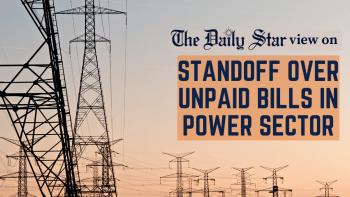Power sector must answer for its persistent failures

Amid unforgiving heatwaves, acute power outages are hurting the nation, and the reason, in case there was still any doubt, lies in the inefficiency of the power sector. According to a recent report, only one third of power plants are currently running at full capacity. The country has 153 power plants, and apart from the fully operational 49, at least 51 are producing at less than half the capacity, while 53 others have been completely shut, leading to the current debacle. Energy security is a key requirement for any state, and the current situation is yet another example of how the government's approach lacks the foresight needed to ensure that.
Over the past decade or so, the government has invested heavily in large-scale projects, defying warnings of energy experts. One of those projects, Payra Power Plant, shut down this week due to a coal shortage and overdue bills worth $390 million. Rampal is also producing at half its capacity due to complications surrounding opening Letters of Credit to import coal. It's an irony that despite having a higher power generation capacity than needed, Bangladesh is struggling with unmet demand, largely due to its ill-advised overreliance on outsiders, undertaking collusive deals and empowering fossil-fuel plants. These plants, even when sitting idle, receive payments in capacity charges, in a sheer wastage of public funds. It is beyond unfair that people are continuously having to pay for such short-sighted decisions of the government.
In Dhaka and other major cities, they have been left without power for many hours a day. The situation is even worse in rural areas. The crisis is also proving to be a blow to the industries, especially the RMG. This calls for an urgent intervention that looks beyond the ongoing dollar crunch, and into long-festering issues that made us vulnerable in the first place.
In the proposed budget for FY2023-24, the government allocated Tk 34, 819 crore to the power sector, and only Tk 994.31 crore to the energy sector. Experts have long called for exploring our own gas reserves and prioritising renewable energy for self-sufficiency and security in the energy sector. The budget allocation, with an inadequate amount for energy development, thus signals that the government would rather maintain the shambolic status quo. This is totally unacceptable. We need proper policies to address our energy vulnerability.


 For all latest news, follow The Daily Star's Google News channel.
For all latest news, follow The Daily Star's Google News channel. 








Comments